Eurovision Song Contest 2004
The Eurovision Song Contest 2004 was the 49th edition of the annual Eurovision Song Contest. It took place in Istanbul, Turkey, following Sertab Erener's win at the 2003 contest in Riga, Latvia with the song "Everyway That I Can". It was the first time Turkey had hosted the contest - 29 years after the country made its debut. Organised by the European Broadcasting Union (EBU) and host broadcaster Turkish Radio and Television Corporation (TRT), the contest was held at the Abdi İpekçi Arena, and (for the first time) consisted of a semi-final on 12 May, and the final on 15 May 2004.[1] The two live shows were hosted by Korhan Abay and Meltem Cumbul.
| Eurovision Song Contest 2004 | |
|---|---|
| Under The Same Sky | |
 | |
| Dates | |
| Semi-final | 12 May 2004 |
| Grand final | 15 May 2004 |
| Host | |
| Venue | Abdi İpekçi Arena Istanbul, Turkey |
| Presenter(s) | |
| Directed by | Sven Stojanovic |
| Executive supervisor | Svante Stockselius |
| Executive producer | Bülent Osma |
| Host broadcaster | Turkish Radio and Television Corporation (TRT) |
| Opening act | Sertab Erener |
| Interval act |
|
| Website | eurovision |
| Participants | |
| Number of entries | 36 |
| Debuting countries | |
| Returning countries |
|
| Non-returning countries | None |
Participation map
| |
| Vote | |
| Voting system | Each country awarded 12, 10, 8-1 point(s) to their 10 favourite songs |
| Nul points |
|
| Winning song | |
It was the first Eurovision Song Contest held in a transcontinental country and city, in a Muslims-majority country and in Turkic language-speaking country.
Thirty-six countries participated in the contest, beating the record of twenty-six in the previous edition. Albania, Andorra, Belarus and Serbia and Montenegro took part for the first time this year. The old relegation system was replaced with a semi-final format. This was done in order to accommodate the increasing number of countries who wished to participate. The new format allowed all countries to participate every year, rather than being forced to sit out per the relegation rules, which had been the standard since 1994. Because of this, Denmark, Finland, Lithuania, Macedonia, Monaco and Switzerland all returned to the contest.
The winner was Ukraine with the song "Wild Dances", performed by Ruslana who wrote it with Oleksandr Ksenofontov (her husband). This was Ukraine's first victory in the contest, after only 1 year of participation. Serbia and Montenegro, Greece, Turkey and Cyprus rounded out the top five.
Due the expansion of the contest,this year was the first time in which a non-winning entry scored over 200 points. Prior to this contest, only the winning entries in 1994 and 1997 had passed this mark. In this contest, the top 3 songs all got over 200 points.
Location
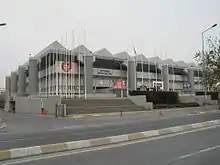
The contest was held in Istanbul following Turkey's victory in the 2003 contest in Riga, Latvia with Sertab Erener's "Everyway That I Can". Originally the Mydonose Showland was chosen by TRT to host the event, but was changed to the Abdi İpekçi Arena as the contest approached due to its bigger capacity.[1] Korhan Abay and Meltem Cumbul were presenters of the show.
In the semi-final and the final, Meltem Cumbul warmed up the audience with a sing-a-long of Eurovision classic "Nel blu dipinto di blu (Volare)", originally by Domenico Modugno. Sertab Erener returned to the stage in the final to perform "Everyway That I Can", the 2003 winning song, and one of her new songs called "Leave". Sertab also interviewed contestants in the green room. The Turkish dance ensemble Fire of Anatolia performed as the interval act.[1] An official CD was released and, for the first time, the entire contest was released on DVD which included the Semi-final and the Grand Final.
Format
Firsts
The contest's new official generic logo was used for the first time this year, with the heart-shaped flag in the centre due to be changed for future contests. The slogan for Istanbul's contest was "Under The Same Sky", which communicated the importance of a united Europe and Turkish integration.
This year was also notable as it was the first year that Turkey voted for Cyprus and the second year in a row that Cyprus voted for Turkey. Nevertheless, in a move that angered some Cypriots, when the country presented its votes no map of the island was shown (all other presenters were preceded with their country being highlighted on a map). This was due to Turkey's recognition of the northern half of the island as an independent republic (not recognised by any other state). It is likely Turkey pulled out of showing the map because it would have only highlighted the southern portion of the island, and thus angered the international community.[1]
This was also the first year that the scores were only re-read by the hosts in one language. Before 2004 every point was repeated in French and English, but due to 36 countries voting, and more in years to come, in 2004 to save time the hosts only re-read each score in one language. This was in the opposite of the original country representative spoke in.
Voting structure
Every country in the competition, including those who did not qualify for the final, were allowed to vote for other countries. After all performances were completed, each country opened their phone lines to allow their viewers to vote for their favourite song. Voting for the country in which you are situated is not allowed, however. Each country awarded points based on the number of votes cast for each song: the song which received the most viewer votes was awarded 12 points, the second 10 points, the third 8 points and then 7, 6, 5, etc. down to 1.
In the event of a tie, the number of countries to vote for the tying songs would be counted, and the song having the most countries awarding points to it, would be the winner. In the event of a further tie, then the previously used method of counting back on the number of 12 points, 10 points etc., would be used to find an eventual winner.
Incidents
Just before the Slovenian entry was about to be performed, the Turkish broadcaster accidentally took a commercial break which meant the Slovenian song was not heard by Turkish viewers and consequently, Turkey gave no votes for the song.[1] There were technical problems when in a short hiatus halfway through the songs, (used for the advertising break), the hosts tried to contact various parties in Europe. They tried contacting Germany, Spain and Turkey, but in the end were only able to get a response from Germany. During the Romanian postcard introduction, the information for the Romanian entry appeared on the screen, but was quickly taken away. A final minor hiccup occurred when, on her way to present the winner the trophy, Sertab Erener got her shoe stuck in a speaker grill by the side of the stage and had to be freed by stagehands. However this did not delay proceedings, and other than the above the show ran smoothly.
An hour after the semi-final had been aired, the European Broadcasting Union discovered that there had been problems with the vote counting in Monaco and Croatia. Digame, an affiliate of Deutsche Telekom, who had been responsible for processing all the votes (from 2004), reported that they had encountered problems with their calculation software, and there was a problem with text message voting in Croatia. When the votes were counted, results showed that Croatia had awarded themselves 4 points, which is against Eurovision rules. Later, an official EBU statement read that there had been technical problems at the side of the Croatian mobile service provider, who neglected to delete the illegal votes from the results. Consequently, some votes were not counted in the results announced at the end of the broadcast of the semi-final. When the results were corrected to include these additional votes, they were found not to have affected which countries had qualified for the Final.[1]
Participating countries
This year's Eurovision contest was the first to be a two-day event, with one qualifying round held on a Wednesday and the grand final held on the following Saturday. Under this new format, byes into the final were given to the 'Big 4'; France, Germany, Spain and the United Kingdom (as the largest financial contributors to the European Broadcasting Union) and the ten highest placed finishers in the 2003 contest.
Andorra, Albania, Belarus and Serbia and Montenegro participated in the Contest for the first time, with Monaco returning after a 25-year absence. Luxembourg were due to return after an absence of 11 years, but later pulled out after money issues arose between RTL and the EBU.
All participating countries had the right to vote in both the qualifying round and the grand final. This was the first year in which all 36 participating countries voted based on a public phone vote. However France, Poland and Russia did not broadcast the semi-final (as they were not participating in it) and therefore did not give votes for it like the other thirty-three countries. In Belgium, the French-language RTBF did not broadcast the semi-final, but the Dutch-language VRT did.
Results
Semi-final
The semi-final was held on 12 May 2004 at 21:00 (CET). 22 countries performed and all participants voted except France, Poland and Russia. This was the first ever semi-final in Eurovision history.
Shaded countries qualified for the Eurovision Final
A new ABBA video was shown in the semi-final, briefly outlining how ABBA started and what the response was of the first record company they approached. It featured small puppets of the band performing snippets of their songs (the voices being the ones of the band) and featured Rik Mayall as the record company manager.[1] This was cut from the Eurovision Song Contest DVD and released separately. References to the video that were made running up to the showing of it were also cut.
Final
The finalists were:
- the four automatic qualifiers France, Germany, Spain and the United Kingdom;
- the top 10 countries from the 2003 contest (other than the automatic qualifiers);
- the top 10 countries from the 2004 semi-final.
The final was held on 15 May 2004 at 21:00 (CET) and was won by Ukraine.
Countries in bold automatically qualified for the Eurovision Song Contest 2005 Final.
Scoreboard
Semi-final
| Voting procedure used: 100% Televoting 100% Jury vote |
Televoting results | ||||||||||||||||||||||||||||||||||||||||
|---|---|---|---|---|---|---|---|---|---|---|---|---|---|---|---|---|---|---|---|---|---|---|---|---|---|---|---|---|---|---|---|---|---|---|---|---|---|---|---|---|---|
| Finland | 51 | 7 | 1 | 6 | 7 | 3 | 5 | 3 | 6 | 2 | 3 | 8 | |||||||||||||||||||||||||||||
| Belarus | 10 | 2 | 1 | 2 | 5 | ||||||||||||||||||||||||||||||||||||
| Switzerland | 0 | ||||||||||||||||||||||||||||||||||||||||
| Latvia | 23 | 4 | 5 | 4 | 2 | 6 | 2 | ||||||||||||||||||||||||||||||||||
| Israel | 57 | 3 | 5 | 1 | 2 | 3 | 3 | 2 | 1 | 2 | 4 | 2 | 2 | 3 | 6 | 2 | 7 | 5 | 4 | ||||||||||||||||||||||
| Andorra | 12 | 12 | |||||||||||||||||||||||||||||||||||||||
| Portugal | 38 | 12 | 4 | 7 | 6 | 1 | 8 | ||||||||||||||||||||||||||||||||||
| Malta | 74 | 5 | 6 | 4 | 1 | 4 | 10 | 5 | 1 | 1 | 1 | 6 | 2 | 7 | 7 | 4 | 3 | 4 | 1 | 2 | |||||||||||||||||||||
| Monaco | 10 | 4 | 2 | 4 | |||||||||||||||||||||||||||||||||||||
| Greece | 238 | 8 | 12 | 5 | 5 | 10 | 8 | 3 | 10 | 12 | 10 | 3 | 4 | 7 | 5 | 12 | 6 | 2 | 12 | 6 | 8 | 6 | 4 | 7 | 12 | 6 | 5 | 8 | 12 | 4 | 4 | 12 | 10 | ||||||||
| Ukraine | 256 | 10 | 3 | 4 | 7 | 8 | 12 | 2 | 8 | 8 | 6 | 6 | 12 | 10 | 8 | 7 | 7 | 8 | 10 | 10 | 10 | 12 | 10 | 5 | 8 | 10 | 7 | 7 | 12 | 7 | 6 | 8 | 8 | ||||||||
| Lithuania | 26 | 2 | 7 | 2 | 3 | 1 | 8 | 3 | |||||||||||||||||||||||||||||||||
| Albania | 167 | 6 | 7 | 6 | 5 | 10 | 6 | 1 | 8 | 7 | 1 | 2 | 6 | 6 | 8 | 7 | 5 | 4 | 4 | 5 | 3 | 12 | 8 | 5 | 8 | 2 | 6 | 7 | 5 | 6 | 1 | ||||||||||
| Cyprus | 149 | 2 | 6 | 6 | 6 | 1 | 2 | 4 | 5 | 6 | 1 | 7 | 10 | 12 | 2 | 8 | 3 | 8 | 4 | 3 | 12 | 5 | 10 | 4 | 3 | 1 | 3 | 3 | 5 | 7 | |||||||||||
| Macedonia | 71 | 8 | 2 | 8 | 5 | 12 | 3 | 1 | 4 | 5 | 1 | 1 | 4 | 2 | 6 | 3 | 6 | ||||||||||||||||||||||||
| Slovenia | 5 | 1 | 3 | 1 | |||||||||||||||||||||||||||||||||||||
| Estonia | 57 | 1 | 4 | 12 | 1 | 7 | 10 | 12 | 1 | 5 | 1 | 3 | |||||||||||||||||||||||||||||
| Croatia | 72 | 8 | 10 | 7 | 6 | 5 | 5 | 1 | 3 | 1 | 6 | 4 | 1 | 7 | 8 | ||||||||||||||||||||||||||
| Denmark | 56 | 3 | 3 | 3 | 4 | 5 | 12 | 10 | 2 | 6 | 2 | 5 | 1 | ||||||||||||||||||||||||||||
| Serbia and Montenegro | 263 | 1 | 4 | 12 | 12 | 7 | 10 | 12 | 10 | 12 | 10 | 8 | 10 | 8 | 10 | 12 | 6 | 8 | 1 | 4 | 7 | 10 | 4 | 12 | 10 | 10 | 10 | 12 | 12 | 7 | 12 | ||||||||||
| Bosnia and Herzegovina | 133 | 10 | 10 | 3 | 8 | 7 | 7 | 12 | 4 | 10 | 7 | 5 | 8 | 12 | 10 | 10 | 10 | ||||||||||||||||||||||||
| Netherlands | 146 | 7 | 3 | 2 | 12 | 5 | 4 | 1 | 5 | 2 | 8 | 8 | 5 | 3 | 3 | 6 | 4 | 12 | 7 | 5 | 5 | 2 | 8 | 3 | 7 | 2 | 6 | 3 | 2 | 2 | 4 | ||||||||||
| Rows are ordered by appearance, columns are ordered by voting order. | |||||||||||||||||||||||||||||||||||||||||
12 points
Below is a summary of all 12 points in the semi-final:
| N. | Contestant | Voting nation |
|---|---|---|
| 9 | Serbia and Montenegro | Austria, Bosnia and Herzegovina, Croatia, Germany, Netherlands, Slovenia, Sweden, Switzerland, Ukraine |
| 7 | Greece | Albania, Cyprus, Israel, Malta, Romania, Turkey, United Kingdom |
| 4 | Ukraine | Belarus, Estonia, Lithuania, Portugal |
| 2 | ||
| Bosnia and Herzegovina | Denmark, Norway | |
| Cyprus | Greece, Monaco | |
| Estonia | Finland, Latvia | |
| Netherlands | Belgium, Ireland | |
| 1 | ||
| Albania | Macedonia | |
| Andorra | Spain | |
| Denmark | Iceland | |
| Macedonia | Serbia and Montenegro | |
| Portugal | Andorra |
Final
| Voting procedure used: 100% Televoting |
Televoting results | ||||||||||||||||||||||||||||||||||||||||
|---|---|---|---|---|---|---|---|---|---|---|---|---|---|---|---|---|---|---|---|---|---|---|---|---|---|---|---|---|---|---|---|---|---|---|---|---|---|---|---|---|---|
| Spain | 87 | 12 | 7 | 2 | 6 | 7 | 2 | 8 | 3 | 8 | 1 | 3 | 1 | 3 | 4 | 1 | 12 | 5 | 2 | ||||||||||||||||||||||
| Austria | 9 | 4 | 5 | ||||||||||||||||||||||||||||||||||||||
| Norway | 3 | 3 | |||||||||||||||||||||||||||||||||||||||
| France | 40 | 7 | 1 | 10 | 4 | 12 | 2 | 4 | |||||||||||||||||||||||||||||||||
| Serbia and Montenegro | 263 | 2 | 7 | 12 | 12 | 3 | 7 | 12 | 10 | 10 | 7 | 1 | 6 | 10 | 10 | 3 | 8 | 12 | 3 | 7 | 7 | 2 | 5 | 1 | 10 | 6 | 10 | 6 | 5 | 7 | 8 | 10 | 12 | 12 | 8 | 12 | |||||
| Malta | 50 | 6 | 3 | 1 | 1 | 6 | 2 | 1 | 2 | 6 | 4 | 4 | 6 | 3 | 3 | 1 | 1 | ||||||||||||||||||||||||
| Netherlands | 11 | 6 | 3 | 2 | |||||||||||||||||||||||||||||||||||||
| Germany | 93 | 2 | 10 | 3 | 10 | 2 | 12 | 7 | 4 | 1 | 4 | 1 | 7 | 3 | 1 | 6 | 8 | 4 | 3 | 5 | |||||||||||||||||||||
| Albania | 106 | 5 | 4 | 1 | 7 | 8 | 5 | 4 | 3 | 1 | 1 | 10 | 6 | 2 | 4 | 1 | 12 | 10 | 1 | 3 | 1 | 7 | 4 | 6 | |||||||||||||||||
| Ukraine | 280 | 10 | 5 | 4 | 6 | 5 | 10 | 10 | 8 | 6 | 5 | 12 | 8 | 8 | 2 | 5 | 7 | 8 | 7 | 12 | 12 | 12 | 12 | 6 | 8 | 8 | 7 | 7 | 12 | 10 | 6 | 12 | 10 | 8 | 12 | ||||||
| Croatia | 50 | 3 | 10 | 5 | 3 | 5 | 1 | 1 | 5 | 5 | 5 | 7 | |||||||||||||||||||||||||||||
| Bosnia and Herzegovina | 91 | 10 | 7 | 5 | 6 | 8 | 10 | 4 | 4 | 2 | 10 | 8 | 10 | 7 | |||||||||||||||||||||||||||
| Belgium | 7 | 1 | 1 | 5 | |||||||||||||||||||||||||||||||||||||
| Russia | 67 | 12 | 1 | 6 | 8 | 4 | 2 | 6 | 8 | 10 | 10 | ||||||||||||||||||||||||||||||
| Macedonia | 47 | 6 | 8 | 1 | 12 | 5 | 1 | 7 | 4 | 3 | |||||||||||||||||||||||||||||||
| Greece | 252 | 8 | 12 | 2 | 5 | 8 | 6 | 4 | 7 | 12 | 7 | 3 | 5 | 7 | 6 | 6 | 12 | 7 | 5 | 10 | 6 | 10 | 7 | 10 | 7 | 12 | 6 | 2 | 7 | 6 | 12 | 7 | 4 | 6 | 10 | 8 | |||||
| Iceland | 16 | 2 | 2 | 5 | 5 | 2 | |||||||||||||||||||||||||||||||||||
| Ireland | 7 | 7 | |||||||||||||||||||||||||||||||||||||||
| Poland | 27 | 2 | 4 | 1 | 4 | 3 | 7 | 1 | 5 | ||||||||||||||||||||||||||||||||
| United Kingdom | 29 | 1 | 4 | 8 | 2 | 3 | 4 | 2 | 2 | 1 | 2 | ||||||||||||||||||||||||||||||
| Cyprus | 170 | 4 | 6 | 4 | 8 | 2 | 3 | 8 | 6 | 7 | 3 | 7 | 5 | 10 | 12 | 4 | 10 | 3 | 10 | 5 | 4 | 2 | 7 | 8 | 4 | 4 | 3 | 3 | 6 | 6 | 1 | 1 | 4 | ||||||||
| Turkey | 195 | 3 | 8 | 8 | 7 | 12 | 3 | 8 | 2 | 4 | 12 | 10 | 2 | 5 | 12 | 6 | 6 | 3 | 1 | 2 | 5 | 3 | 2 | 8 | 6 | 12 | 8 | 8 | 10 | 8 | 5 | 6 | |||||||||
| Romania | 18 | 3 | 10 | 1 | 4 | ||||||||||||||||||||||||||||||||||||
| Sweden | 170 | 5 | 4 | 1 | 2 | 2 | 4 | 4 | 5 | 3 | 12 | 10 | 5 | 12 | 3 | 8 | 12 | 5 | 8 | 6 | 8 | 2 | 5 | 12 | 10 | 5 | 7 | 3 | 2 | 3 | 2 | ||||||||||
| Rows are ordered by appearance, columns are ordered by voting order. | |||||||||||||||||||||||||||||||||||||||||
12 points
Below is a summary of all 12 points in the final:
| N. | Contestant | Voting nation |
|---|---|---|
| 8 | Ukraine | Estonia, Israel, Iceland, Latvia, Lithuania, Poland, Russia, Turkey |
| 7 | Serbia and Montenegro | Austria, Bosnia and Herzegovina, Croatia, Sweden, Switzerland, Slovenia, Ukraine |
| 5 | Greece | Albania, Cyprus, Malta, Romania, United Kingdom |
| 4 | Sweden | Denmark, Finland, Ireland, Norway |
| Turkey | Belgium, Germany, France, Netherlands | |
| 2 | Spain | Andorra, Portugal |
| 1 | Albania | Macedonia |
| Cyprus | Greece | |
| France | Monaco | |
| Germany | Spain | |
| Macedonia | Serbia and Montenegro | |
| Russia | Belarus |
Other awards
AP Awards
| Category | Country | Song | Performer(s) | Result | Points |
|---|---|---|---|---|---|
| Artist Award | "Life" | Toše Proeski | 14 | 47 | |
| Composer Award | "Hold Onto Our Love" | James Fox | 16 | 29 | |
| Performance Award | "Wild Dances" | Ruslana | 1 | 280 | |
| Song Award | "Foi Magia" | Sofia Vitória | 15 SF | 38 SF |
Marcel Bezençon Awards
The Marcel Bezençon Awards were first handed out during the Eurovision Song Contest 2002 in Tallinn, Estonia honoring the best competing songs in the final. Founded by Christer Björkman (Sweden's representative in the 1992 Eurovision Song Contest and current Head of Delegation for Sweden) and Richard Herrey (member of the Herreys, Eurovision Song Contest 1984 winner from Sweden), the awards are named after the creator of the annual competition, Marcel Bezençon.[3] The awards are divided into 3 categories: Press Award, Artistic Award, and Composer Award.[4]
| Category | Country | Song | Performer(s) | Composer(s) | Final | Points |
|---|---|---|---|---|---|---|
| Artistic Award[lower-alpha 1] | "Wild Dances" | Ruslana | Oleksandr Ksenofontov Ruslana Lyzhychko |
1 | 280 | |
| Composer Award | "Stronger Every Minute" | Lisa Andreas | Mike Konnaris (m & l) | 5 | 170 | |
| Press Award | "Lane moje" (Лане моје) | Željko Joksimović | Željko Joksimović | 2 | 263 |
Commentators and spokespersons
Participating countries
 Albania – Leon Menkshi (TVSH)
Albania – Leon Menkshi (TVSH)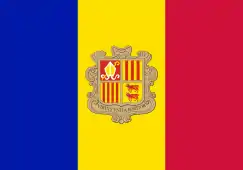 Andorra – Meri Picart & Josep Lluís Trabal (RTVA)
Andorra – Meri Picart & Josep Lluís Trabal (RTVA) Austria – Andi Knoll (ORF2), Martin Blumenau (Final – Hitradio Ö3)
Austria – Andi Knoll (ORF2), Martin Blumenau (Final – Hitradio Ö3).svg.png.webp) Belarus – Ales Kruglyakou (Belarus 1)
Belarus – Ales Kruglyakou (Belarus 1).svg.png.webp) Belgium – Dutch: André Vermeulen and Bart Peeters (VRT TV1),[5] Julien Put and Michel Follet (Final – VRT Radio 2), French: Jean-Pierre Hautier (La Une),[6] Patrick Duhamel and Serges Otthiers (Final – La Première)
Belgium – Dutch: André Vermeulen and Bart Peeters (VRT TV1),[5] Julien Put and Michel Follet (Final – VRT Radio 2), French: Jean-Pierre Hautier (La Une),[6] Patrick Duhamel and Serges Otthiers (Final – La Première)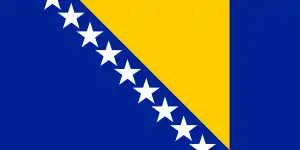 Bosnia and Herzegovina – Dejan Kukric (BHTV1)
Bosnia and Herzegovina – Dejan Kukric (BHTV1) Croatia – Aleksandar "Aco" Kostadinov[7]
Croatia – Aleksandar "Aco" Kostadinov[7].svg.png.webp) Cyprus – Evi Papamichail (RIK 1)[8]
Cyprus – Evi Papamichail (RIK 1)[8] Denmark – Jørgen de Mylius (DR1)[9]
Denmark – Jørgen de Mylius (DR1)[9] Estonia – Marko Reikop (ETV)[10] and Vello Rand (Raadio 2)
Estonia – Marko Reikop (ETV)[10] and Vello Rand (Raadio 2) Finland – Finnish: Markus Kajo and Asko Murtomäki (YLE TV2),[11] Sanna Kojo and Jorma Hietamäki (YLE Radio Suomi);[12] Swedish: Thomas Lundin (YLE FST)
Finland – Finnish: Markus Kajo and Asko Murtomäki (YLE TV2),[11] Sanna Kojo and Jorma Hietamäki (YLE Radio Suomi);[12] Swedish: Thomas Lundin (YLE FST) France – Laurent Ruquier and Elsa Fayer (Final – France 3),[6] Jean-Luc Delarue (Final – France Bleu)
France – Laurent Ruquier and Elsa Fayer (Final – France 3),[6] Jean-Luc Delarue (Final – France Bleu) Germany – Peter Urban (All – Das Erste),[13] Thomas Mohr (Deutschlandfunk/NDR 2)[14]
Germany – Peter Urban (All – Das Erste),[13] Thomas Mohr (Deutschlandfunk/NDR 2)[14] Greece – Dafni Bokota (NET)[15]
Greece – Dafni Bokota (NET)[15] Iceland – Gísli Marteinn Baldursson (Sjónvarpið)[16]
Iceland – Gísli Marteinn Baldursson (Sjónvarpið)[16] Ireland – Marty Whelan (All – RTÉ One),[17]
Ireland – Marty Whelan (All – RTÉ One),[17] Israel – No commentator
Israel – No commentator Latvia – Kārlis Streips
Latvia – Kārlis Streips.svg.png.webp) Lithuania – Darius Užkuraitis
Lithuania – Darius Užkuraitis Macedonia – Milanka Rasic
Macedonia – Milanka Rasic Malta – Eileen Montesin[18]
Malta – Eileen Montesin[18]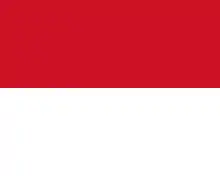 Monaco – Bernard Montiel & Génie Godula (TMC Monte Carlo)
Monaco – Bernard Montiel & Génie Godula (TMC Monte Carlo) Netherlands – Willem van Beusekom and Cornald Maas (Nederland 2),[19] Hijlco Span and Ron Stoeltie (Radio 3)
Netherlands – Willem van Beusekom and Cornald Maas (Nederland 2),[19] Hijlco Span and Ron Stoeltie (Radio 3) Norway – Jostein Pedersen (NRK1)[20]
Norway – Jostein Pedersen (NRK1)[20] Poland – Artur Orzech (TVP1)[21]
Poland – Artur Orzech (TVP1)[21] Portugal – Eládio Clímaco (RTP1)[22]
Portugal – Eládio Clímaco (RTP1)[22] Romania – Andreea Demirgian (TVR1)
Romania – Andreea Demirgian (TVR1) Russia – Yuri Aksyuta and Yelena Batinova (Channel One)
Russia – Yuri Aksyuta and Yelena Batinova (Channel One)%253B_Flag_of_Serbia_and_Montenegro_(2003%E2%80%932006).svg.png.webp) Serbia and Montenegro – Serbian: Duška Vučinić-Lučić (RTS1), Montenegrin: Dražen Bauković and Tamara Ivanković (TVCG2))
Serbia and Montenegro – Serbian: Duška Vučinić-Lučić (RTS1), Montenegrin: Dražen Bauković and Tamara Ivanković (TVCG2)) Slovenia – Andrea F
Slovenia – Andrea F Spain – Beatriz Pécker (semi-final TVE2, final TVE1)[23]
Spain – Beatriz Pécker (semi-final TVE2, final TVE1)[23] Sweden – Pekka Heino (SVT1),[24] Björn Kjellman and Carolina Norén (SR P3)[25]
Sweden – Pekka Heino (SVT1),[24] Björn Kjellman and Carolina Norén (SR P3)[25]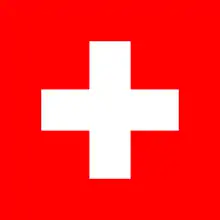 Switzerland – German: Marco Fritsche (SF1),[26] French: Jean-Marc Richard and Alain Morisod (TSR1), Italian: Daniela Tami and Claudio Lazzarino (TSI 1)
Switzerland – German: Marco Fritsche (SF1),[26] French: Jean-Marc Richard and Alain Morisod (TSR1), Italian: Daniela Tami and Claudio Lazzarino (TSI 1) Turkey – Bülend Özveren and Didem Tolunay (TRT 1),[27] Ümit Tunçağ, Osman Erkan and Gülşah Banda (Final – TRT Radyo 3)
Turkey – Bülend Özveren and Didem Tolunay (TRT 1),[27] Ümit Tunçağ, Osman Erkan and Gülşah Banda (Final – TRT Radyo 3) Ukraine – Rodion Pryntsevsky (First National TV Channel),[28]
Ukraine – Rodion Pryntsevsky (First National TV Channel),[28] United Kingdom – Paddy O'Connell (Semi-final – BBC Three), Terry Wogan (Final – BBC One), Ken Bruce (Final – BBC Radio 2)
United Kingdom – Paddy O'Connell (Semi-final – BBC Three), Terry Wogan (Final – BBC One), Ken Bruce (Final – BBC Radio 2)
Non-participating countries
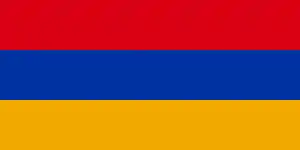 Armenia – Unknown (Armenia TV)[29]
Armenia – Unknown (Armenia TV)[29].svg.png.webp) Australia – Des Mangan (SBS TV)[30]
Australia – Des Mangan (SBS TV)[30]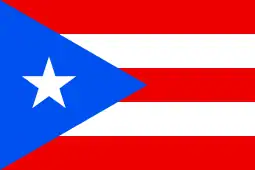 Puerto Rico – (MSN)[29]
Puerto Rico – (MSN)[29] United States – Unknown (Israeli Network)[29]
United States – Unknown (Israeli Network)[29]
Spokespersons
Each country appointed a spokesperson to announce their respective country's points.[31]
 Andorra – Pati Molné
Andorra – Pati Molné Albania – Zhani Ciko
Albania – Zhani Ciko Austria – Dodo Roščić
Austria – Dodo Roščić Bosnia and Herzegovina – Mija Martina (Bosnian representative in the 2003 contest)
Bosnia and Herzegovina – Mija Martina (Bosnian representative in the 2003 contest).svg.png.webp) Belgium – Martine Prenen
Belgium – Martine Prenen.svg.png.webp) Belarus – Denis Kurian
Belarus – Denis Kurian Switzerland – Emel Aykanat
Switzerland – Emel Aykanat%253B_Flag_of_Serbia_and_Montenegro_(2003%E2%80%932006).svg.png.webp) Serbia and Montenegro – Nataša Miljković
Serbia and Montenegro – Nataša Miljković.svg.png.webp) Cyprus – Loukas Hamatsos
Cyprus – Loukas Hamatsos Germany – Thomas Anders
Germany – Thomas Anders Denmark – Camilla Ottesen
Denmark – Camilla Ottesen Estonia – Maarja-Liis Ilus (Estonian representative in the 1996 and 1997 contests)
Estonia – Maarja-Liis Ilus (Estonian representative in the 1996 and 1997 contests) Spain – Anne Igartiburu
Spain – Anne Igartiburu Finland – Anna Stenlund
Finland – Anna Stenlund France – Alex Taylor
France – Alex Taylor United Kingdom – Lorraine Kelly
United Kingdom – Lorraine Kelly Greece – Alexis Kostalas
Greece – Alexis Kostalas Croatia – Barbara Kolar
Croatia – Barbara Kolar Ireland – Johnny Logan (winner of the 1980 and 1987 contests, winning composer in the 1992 contest)
Ireland – Johnny Logan (winner of the 1980 and 1987 contests, winning composer in the 1992 contest) Israel – Merav Miller
Israel – Merav Miller Iceland – Sigrún Ósk Kristjánsdóttir
Iceland – Sigrún Ósk Kristjánsdóttir.svg.png.webp) Lithuania – Rolandas Vilkončius
Lithuania – Rolandas Vilkončius Latvia – Lauris Reiniks (Latvian representative in the 2003 contest as a part of F.L.Y.)
Latvia – Lauris Reiniks (Latvian representative in the 2003 contest as a part of F.L.Y.) Monaco – Anne Allegrini
Monaco – Anne Allegrini Malta – Claire Agius
Malta – Claire Agius Macedonia – Karolina Petkovska
Macedonia – Karolina Petkovska Netherlands – Esther Hart (Dutch representative in the 2003 contest)
Netherlands – Esther Hart (Dutch representative in the 2003 contest) Norway – Ingvild Helljesen
Norway – Ingvild Helljesen Poland – Maciej Orłoś
Poland – Maciej Orłoś Portugal – Isabel Angelino
Portugal – Isabel Angelino Romania – Andreea Marin
Romania – Andreea Marin Russia – Yana Churikova
Russia – Yana Churikova Sweden – Jovan Radomir
Sweden – Jovan Radomir Slovenia – Peter Poles
Slovenia – Peter Poles Turkey – Meltem Ersan Yazgan
Turkey – Meltem Ersan Yazgan Ukraine – Pavlo Shylko (DJ Pascha) (Later co-presenter of the 2005 contest)
Ukraine – Pavlo Shylko (DJ Pascha) (Later co-presenter of the 2005 contest)
Official album
| Eurovision Song Contest: Istanbul 2004 | ||||
|---|---|---|---|---|
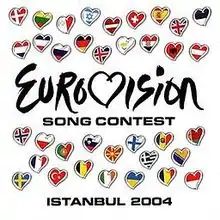 | ||||
| Compilation album by | ||||
| Released | 26 April 2004 | |||
| Genre | Pop | |||
| Length |
| |||
| Label | EMI / CMC | |||
| Eurovision Song Contest chronology | ||||
| ||||
Eurovision Song Contest: Istanbul 2004 was the official compilation album of the 2004 Contest, put together by the European Broadcasting Union and released by EMI Records and CMC International on 26 April 2004. The album featured all 36 songs that entered in the 2004 contest, including the semi-finalists that failed to qualify into the grand final.[32]
Charts
| Chart (2004) | Peak position |
|---|---|
| German Compilation Albums (Offizielle Top 100)[33] | 3 |
Notes and references
Notes
- Voted by previous winners.
References
- Bakker, Sietse (25 December 2009). "The end of a decade: Istanbul 2004". European Broadcasting Union. Retrieved 25 December 2009.
- "Eurovision Song Contest 2004". The Diggiloo Thrush. Retrieved 5 March 2012.
- "Marcel Bezençon Award – an introduction". Poplight. Archived from the original on 17 October 2013. Retrieved 2 June 2009.
- "Winners of the Marcel Bezençon Awards 2012 | Eurovision Song Contest – Baku 2012". Eurovision Song Contest. Retrieved 9 August 2012.
- "Bart Peeters co-commentator op songfestival : showbizz". Mijnnieuws.skynetblogs.be. Archived from the original on 2 April 2012. Retrieved 9 August 2012.
- Christian Masson. "2004 – Istanbul". Songcontest.free.fr. Retrieved 9 August 2012.
- "• Pogledaj temu – Prijedlog – Eurosong večer(i) na HRT-u!". Forum.hrt.hr. 27 March 2011. Archived from the original on 14 March 2012. Retrieved 9 August 2012.
- Savvidis, Christos (OGAE Cyprus)
- "Forside". esconnet.dk. Archived from the original on 24 March 2012. Retrieved 9 August 2012.
- Archived 2 September 2011 at the Wayback Machine
- Archived 30 November 2006 at the Wayback Machine
- Julkaistu To, 29 April 2010 – 10:19 (29 April 2010). "YLE Radio Suomen kommentaattorit | yle.fi | Arkistoitu". yle.fi. Retrieved 9 August 2012.
- "Dr. Peter Urban kommentiert – Düsseldorf 2011". Duesseldorf2011.de. Archived from the original on 24 March 2012. Retrieved 9 August 2012.
- "Thomas Mohr: Mit Dschinghis Khan im Garten". Eurovision.de. 14 May 2011. Retrieved 28 October 2012.
- "Η Δάφνη Μπόκοτα και η EUROVISION (1987–2004)". Retromaniax.gr. Archived from the original on 12 September 2012. Retrieved 9 August 2012.
- "Fréttablaðið, 15 May 2004". Timarit.is. Retrieved 9 August 2012.
- "RTE so lonely after loss of Gerry – Marty". 20 May 2010. Retrieved 29 May 2010.
He has been providing commentary for Irish viewers since 2000 and maintains great enthusiasm for the much lampooned contest.
- Archived 12 February 2010 at the Wayback Machine
- "Welkom op de site van Eurovision Artists". Eurovisionartists.nl. Retrieved 9 August 2012.
- "Alt du trenger å vite om MGP – Melodi Grand Prix – Melodi Grand Prix". NRK. 27 May 2003. Retrieved 9 August 2012.
- "Pliki użytkownika Eurowizja". Chomikuj.pl. Retrieved 9 August 2012.
- "Comentadores Do ESC – escportugalforum.pt.vu | o forum eurovisivo português". 21595.activeboard.com. Archived from the original on 21 April 2012. Retrieved 9 August 2012.
- "FORO FESTIVAL DE EUROVISIÓN • Ver Tema – Uribarri comentarista Eurovision 2010". Eurosongcontest.phpbb3.es. Archived from the original on 17 March 2012. Retrieved 9 August 2012.
- "Infosajten.com". Infosajten.com. Archived from the original on 18 July 2012. Retrieved 9 August 2012.
- "Swedes stay at home with Eurovision fever". The Local. 16 May 2009. Archived from the original on 15 May 2013. Retrieved 29 September 2012.
- "Marco Fritsche kommentiert 'Eurovision Song Contest'". persoenlich.com. Retrieved 17 February 2016.
- "2004 semi-final Meltem Cumbul and Korhan Abay". Retrieved 9 August 2012 – via YouTube.
- "Запитання "Телекритики": - Що, на вашу думку, потрібно для того, щоб українське ТБ на належному рівні організувало трансляцію "Євробачення-2005"?". Telekritika.ua. Archived from the original on 23 October 2013. Retrieved 22 October 2013.
- "EBU.CH :: 2004_05_11_ESC". 8 April 2005. Archived from the original on 8 April 2005.
- "Eurovision scandal - SBS dumps Wogan! - inthemix Forums". inthemix.com.au.
- Archived 29 January 2007 at the Wayback Machine
- Sietse Bakker (31 March 2004). "2004 album to be released as double cd". esctoday.com. ESCToday. Retrieved 5 November 2014.
- "Eurovision Song Contest 2004". Offiziellecharts.de. GfK Entertainment Charts. Retrieved 17 March 2018.
External links
 Media related to Eurovision Song Contest 2004 at Wikimedia Commons
Media related to Eurovision Song Contest 2004 at Wikimedia Commons- Official website
- EBU press notice regarding voting problems in the semi-final
- Details about the 2004 Eurovision Song Contest in Istanbul
- Video Clips (BBC Eurovision 2004) (RealPlayer)
